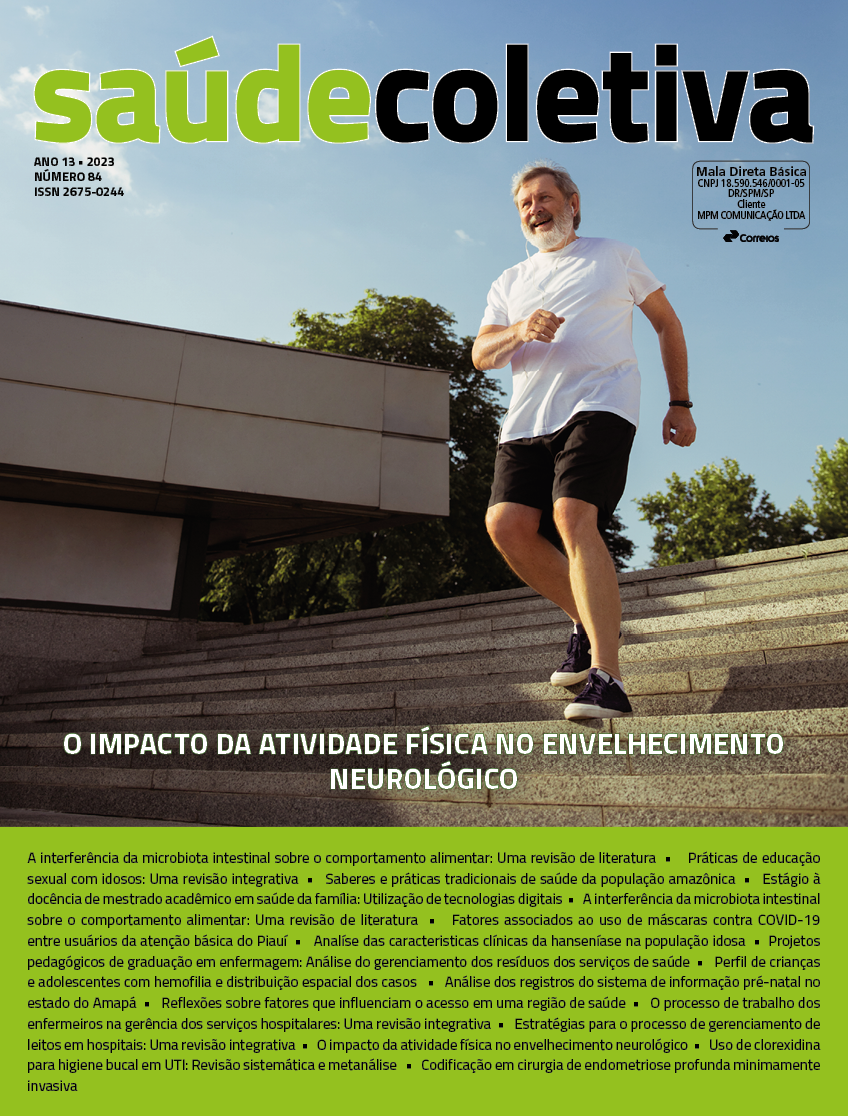Pedagogic projects of undergraduate nursing courses in the topama region: Analysis regarding the management of waste from health services
DOI:
https://doi.org/10.36489/saudecoletiva.2023v13i84p12290-12301Keywords:
Solid waste management, University education, nursingAbstract
Object: The present work aims to carry out a documentary research on the Pedagogical Projects of the Nursing Undergraduate Courses (PPC's) of some Universities in the region of Tocantins, Pará and Maranhão, with an emphasis on the theme of waste management from health services. Method: A descriptive documental research was used, whose data were obtained from the websites of the courses and/or universities included in the research. Result: The total research sample consisted of eight institutions that were identified by the coding (Higher Education), numbered from 1 to 8. After analyzing the PPC's of each institution, it can be noted that the element Health Services Waste Management was identified on the pages of the Pedagogical Course Projects of only two of the eight higher education institutions included in the study. Conclusion: It is concluded that nurses have an important role in the management of waste from health services, from planning to implementation, and knowledge on this topic is necessary.
References
Brasil. Resolução RDC Nº. 222, De 28 de Março De 2018. ANVISA, Agência Nacional de Vigilância Sanitária, Ministério da Saúde – Brasília, 2018.
Bataglin, M. S., de Souza, M. H. T., & Camponogara, S. (2012). Conhecimento da equipe de enfermagem sobre a segregação dos resíduos sólidos em ambiente hospitalar. Ensino, Saúde e Ambiente, 5(3).
Brasil, Ministério do Meio Ambiente. Política de Resíduos Sólidos, Lei nº 12.305/10. 2010.
Brasil. Constituição da República Federativa do Brasil de 1988. p. 29. Disponível em: http://www.planalto.gov.br/ccivil_03/constituicao/constituicao.htm. Acesso em: 11/08/2019.
Brasil. Ministério da Saúde. Agência Nacional de Vigilância Sanitária. Manual de gerenciamento de resíduos de serviços de saúde / Ministério da Saúde, Agência 6.Nacional de Vigilância Sanitária. – Brasília : Ministério da Saúde, 2006. 182 p. – (Série A. Normas e Manuais Técnicos).
Conama. Resolução CONAMA 358, de 29 de abril de 2005. Dispõe sobre o tratamento e a disposição final dos resíduos dos serviços de saúde e dá outras providências. Diário Oficial da República Federativa do Brasil, Brasília (DF), 04 maio 2005.
Cofen, Conselho Federal de Enfermagem. RESOLUÇÃO COFEN-303/2005. Cofen – Conselho Federal de Enfermagem. Disponível em: http://www.cofen.gov.br/resoluo-cofen-3032005_4338.html. Acesso em: 02/05/2019.
Feitosa, Marcela de Oliveira. Gerenciamento dos resíduos de serviço de saúde: estudo em dois hospitais da microrregião do Bico do Papagaio – Tocantins – Brasil, Dissertação (Mestrado em Ciências Ambientais) UNITAU, Taubaté-SP, 2013.
Martins Fernanda Costa, et al. Gerenciamento de Resíduos de Serviços de Saúde: Conhecimento da Equipe de Enfermagem. Ciências Biológicas e de Saúde Unit, Aracaju- SE v. 4, n. 2, p. 169-184, Out. 2017, p.180.
Ipea - Instituto de Pesquisa Econômica Aplicada. Resíduos sólidos urbanos no Brasil: desafios tecnológicos, políticos e econômicos. 2020. Disponível em: https://www.ipea.gov.br/cts/pt/central-de-conteudo/artigos/artigos/217-residuos-solidos-urbanos-no-brasil-desafios-tecnologicos-politicos-e-economicos. Acesso em: 05/06/2021.
Ogata, Igor Souza et al. Avaliação da qualidade do gerenciamento dos resíduos sólidos em laboratórios de análises físico-químicas e microbiológicas: uma abordagem multicriterial. Revista de Estudos Ambientais, [S.l.], v. 22, n. 2, p. 22-31, maio 2021. ISSN 1983-1501. doi: http://dx.doi.org/10.7867/1983-1501.2020v22n2p22-31.
Sanches Apm, Mekaro Ks, Figueiredo Rm, Andre Scs. Health-Care Waste: Knowledge of Primary Care nurses. Rev Bras Enferm [Internet]. v. 71, n.5, p.2367-75, 2017. DOI: http://dx.doi.org/10.1590/0034-7167-2017-0244.
Santos, Elitiele Ortiz et al. Aprendizagem baseada em problemas no ensino da enfermagem. Revista Contexto & Saúde, v. 17, n. 32, p. 55-66, 2017. Disponível em:<https://revistas.unijui.edu.br/index.php/contextoesaude/article/view/6353>. Acesso em: 30 de JUN DE 2021.
Silva, Ivanilton Santana da. A enfermagem no gerenciamento dos resíduos de servicos de saúde: uma revisão narrativa. Universidade Católica do Salvador. Faculdade de Enfermagem. SALVADOR-BA 2020, 27p.
Uft, Universidade Federal do Tocantins. Rede Topama: Gestão e Planejamento em Saúde Pública. Organizadores: Paulo Fernando de Melo Martins e Renata Junqueira Pereira; Autoras: Andrielly Gomes et al. - Palmas, TO: UFT/Central Qualitopama, 2021. 156p.:il. Color
Kormondy, E. J.; Brown, D. E. Ecologia humana. São Paulo: Atheneu, 2002. 503 p. ISBN: 8574540730.
Philippi Junior, A. (Editor). Saneamento, saúde e ambiente: fundamentos para um desenvolvimento sustentável. São Paulo: Manole, 2005. 842 p.
Odum, Eugene P; BARRET, Gary W. Fundamentos de ecologia. São Paulo: Thompson Learning, 2007. 612 p. ISBN: 9788522105410.
Rouquayrol, M. Z.; SILVA, M. G. C. (Org). Epidemiologia & saúde. 7. ed. Rio de Janeiro: Medbook, 2013. 709 p. ISBN: 978859997842.
Carvalho, I. C. M. Educação ambiental: a formação do sujeito ecológico. 6. ed. São Paulo: Cortez, 2012. 255 p. ISBN: 9788524919725.
Cohn, A. Saúde no Brasil: políticas e organização de serviços. 5. ED. São Paulo: Cortez: Cedec, 2003. 133p.
De angelis, R. C. A importância dos alimentos vegetais na proteção da saúde: fisiologia da nutrição protetora e preventiva de enfermidades degenerativas. 2.E D. São Paulo: Atheneu, 2006. 317p.
Figueiredo, Nebia Maria Almeida De; Tonini, Teresa. SUS E PSF PARA ENFERMAGEM: PRÁTICAS PARA O CUIDADO EM SAÚDE COLETIVA. Sao Caetano do Sul,Sp: Yendis, 2008. 312.
Gliessman, S. R. Agroecologia: processos ecológicos em agricultura sustentável. 4 ED. Porto Alegre: Ed.Unversidade/Ufrgs, 2009. 654p







